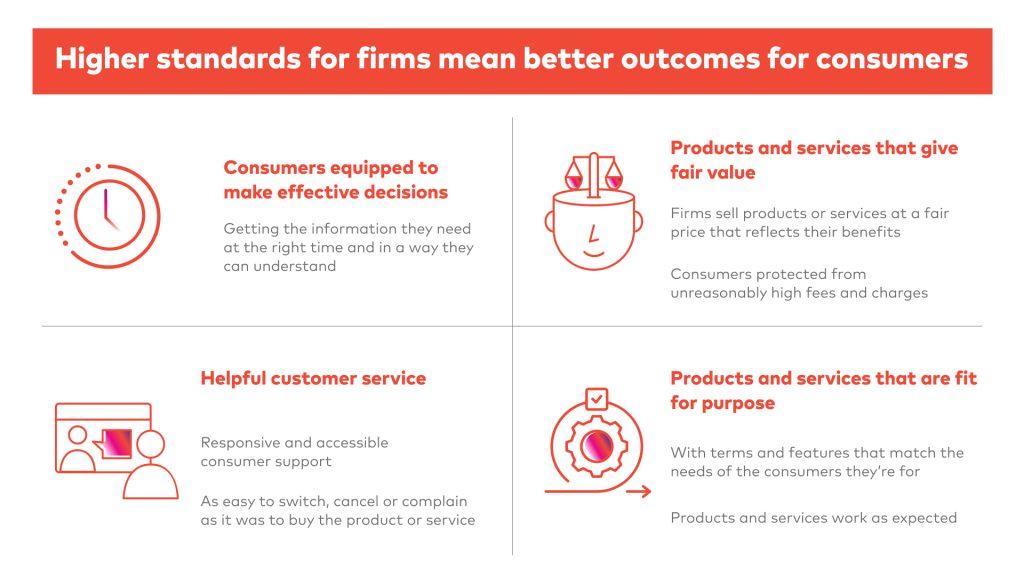Do you expect financial services firms to deliver good outcomes to you if you, for example, buy an insurance policy or take out a mortgage with them? I certainly do and believe that most, if not all, consumers do too. This common expectation will soon become a new duty of care owed to 52 million financial services consumers in the United Kingdom.
The new ‘Consumer Duty’ of the Financial Conduct Authority (FCA, a U.K. regulator) will come into force on July 31 for new and existing products and services that are open to sale or renewal by financial services firms. These firms will owe a duty of care to their consumers and will have to evidence how they are discharging it. According to the regulator, the new duty sets higher and clearer standards of consumer protection across financial services and requires firms to put their customers’ needs first.
To put customers’ needs first, a new Consumer Principle determines that firms must act to deliver good outcomes for retail customers in the U.K. New cross-cutting rules will require firms to act in good faith, avoid causing foreseeable harm, and enable and support retail customers to pursue their financial objectives. The following four outcomes are expected to be achieved and evidenced by firms: consumers are equipped to make effective decisions; products and services give fair value; products and services are fit for purpose; and helpful customer service.

The regulator recognizes that, too often, consumers do not get the benefits or value they should expect from products and services and do not get the information or help they need, when they need it. It is committed to prioritizing the most serious breaches of the duty and to act swiftly and assertively where it finds evidence of harm or risk of harm to consumers.
To demonstrate compliance, firms will have to evidence the outcomes their customers are receiving. FCA rules also require firms to consider the needs, characteristics, and objectives of their customers – including those with characteristics of vulnerability – and how they behave, at every stage of the customer journey.
There will be a greater focus on data and how firms maximize the benefits of technology to better understand their customer base and to identify different needs by diverse groups in order to deliver relevant, fair, and proportionate products and services. Behavioral Economics and Behavioral Science/Data Science are disciplines that can help firms understand customer behavior and how the firm’s policies and processes impact the choices that are available, or not, to their customers at every stage of the customer experience. I do not intend to discuss how these disciplines could help in this article (maybe a future piece), but it is worth mentioning here given that, together with technology, they are key enablers to support firms with compliance.
Data about how financial services firms’ employees understand and deliver the duty is another aspect of this more data-driven approach firms will have to adopt. For many firms, the duty will require a significant shift in culture in order to put customers at the center of business decisions. The regulator expects firms to be asking themselves: “Does your purpose and culture align with your obligations under the duty and support the delivery of good outcomes for customers?”
Firms will need to have mechanisms to collect, analyze, and benchmark information to better understand and manage their organizational culture, aligning them with the duty. In the last Financial Services Culture Board (FSCB) Employee Survey (2022) – a large-scale survey to assess organizational culture in financial services firms in the U.K. – the results of the four additional questions related to the concepts outlined in the FCA’s duty showed significant variance in employee responses across business units. The FSCB explained that “this variance in results highlights the importance of firms drilling down to understand where and why differences may exist across their business units, and tailoring implementation of the Consumer Duty to respond to the different ‘current states’ of these teams.”
Data-driven, risk-based and outcome-focused approaches to regulation are welcome as well as objectives that enhance consumer protection and ensure customers are getting good value products and services. The intended outcomes of the duty are honorable. However, for some, the jury is out. The consistency in implementation and enforcement will determine its success in the long term.
Rick Borges writes on regulation and related topics in financial services. With his extensive experience spanning the financial services and health care sectors, he acted as an advisor on professional standards and regulation to organizations in the U.K. and internationally.
MORE VOICES ARTICLES

Trust on trial: Navigating the murky waters of scientific integrity
As fraudulent research papers flood academic journals, the sanctity of scientific discovery is under siege, challenging the very foundation of trust we place in peer-reviewed publications. With AI now both a tool for creating and detecting such deceptions, the urgency for a robust, independent regulatory framework in scientific publishing has never been greater.

Do regulators deserve deference?
In a pivotal moment for regulatory law, the U.S. Supreme Court’s review of the Chevron doctrine could redefine the bounds of deference courts give to regulatory agencies, potentially inviting more challenges to their authority. This critical examination strikes at the heart of longstanding legal principles, signaling a significant shift in the landscape of regulatory oversight and its interpretation by the judiciary.

From Frankenstein to Siri: Accountability in the era of automation
As AI advances in sectors from health care to engineering, who will be held accountable if it causes harm? And as human decision-makers are replaced by algorithms in more situations, what will happen to uniquely human variables like empathy and compassion? Harry Cayton explores these questions in his latest article.

Regulating joy: The risky business of festivities
In his final Voices article of 2023, Harry Cayton reflects on our enthusiasm for participating in cultural festivities that often cause injuries or even deaths, which has led some governments to attempt to regulate these risky celebrations.

Building my regulator of tomorrow with LEGO® bricks
What should the regulator of tomorrow look like? While there may be no definitive vision, contributor Rick Borges gets creative with answering this important question, drawing inspiration from a favorite toy to ‘build’ a model of an effective future regulator.

‘Thin’ and ‘thick’ rules of regulation: Cayton reviews Daston’s history of what we live by
Lorraine Daston explores fascinating examples of rulemaking throughout history in her new book, ‘Rules: A Short History of What We Live By.’ In this article, Harry Cayton discusses what regulators can learn from Daston’s work.








